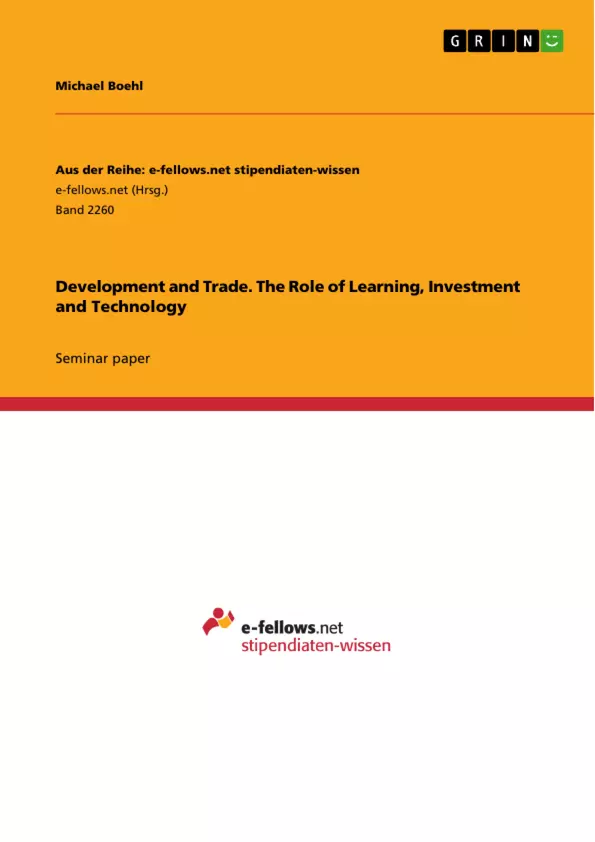In order to achieve economic development, here understood as GDP growth, it is often suggested that developing countries would only need to ensure free trade and good institutions. Nevertheless countries pursuing institutional quality and trade openness, namely in Latin America, have failed to achieve sustainable economic development. Meanwhile others, namely in South and East Asia, have achieved remarkable economic growth rates, without functioning markets and property rights in place.
The questions I try to answer are: How can a theoretical framework be designed to explain the mentioned inefficiencies of the laisez-faire equilibrium in comparison to a socially optimal situation? Can it be argued that the above mentioned diverging growth success of different developing countries has been due to varying quality of chosen policy options? Do, by their enhancement, Rodrik and Hausmann explain the seemingly anomalies within the established theory on development economics?
Inhaltsverzeichnis (Table of Contents)
- INTRODUCTION.
- MODEL AND EMPIRICS ON DEVELOPMENT, INVESTMENT AND LEARNING
- 1ST MODEL - THEORETICAL PART..
- 1ST EVIDENCE - EMPIRICAL PART
- MODEL AND EMPIRICS ON DEVELOPMENT, SPECIALISATION AND TRADE....
- 2ND MODEL - THEORETICAL PART..
- 2ND EVIDENCE - EMPIRICAL PART
- CONCLUSION.
Zielsetzung und Themenschwerpunkte (Objectives and Key Themes)
This paper explores the role of policy in stimulating economic development in developing countries, particularly focusing on the discovery process of new sectors, goods, and technologies. The authors argue that traditional explanations, emphasizing free trade and good institutions, are insufficient to explain the diverging growth experiences of developing countries. Instead, they highlight the importance of policy interventions that incentivize and foster the discovery process, while considering the implications of domestic imitation and externalities.
- The role of policy in fostering economic development
- The discovery process of new sectors, goods, and technologies
- The impact of domestic imitation and externalities
- The interplay between policy, specialization, and economic growth
- The limitations of traditional development economics perspectives
Zusammenfassung der Kapitel (Chapter Summaries)
The introduction presents the research question and context, highlighting the divergence in economic growth between developing countries despite similar institutional and trade policies. The paper aims to explain this divergence by emphasizing the importance of a discovery process, where entrepreneurs identify new sectors, goods, and technologies to specialize in. This process is inherently uncertain and influenced by various factors, including the availability of technology, domestic imitation, and the role of government policy. The authors emphasize the challenges of traditional approaches to development economics in explaining this process.
Chapter 2.1 focuses on the model and empirical evidence surrounding development, investment, and learning. The theoretical part of the chapter explores the role of uncertainty about production patterns, difficulties in importing technology, and the rapidness of domestic imitation. The authors argue that these factors create a gap between private and social returns to investment, necessitating policy interventions to incentivize the discovery process. The empirical part of the chapter examines evidence supporting the theoretical framework, examining the relationship between policy choices, investment patterns, and economic growth. The authors discuss various policy options, such as fostering a competitive environment and encouraging innovation, to address the challenges of stimulating discovery and economic growth.
Schlüsselwörter (Keywords)
The paper focuses on the key concepts of economic development, discovery process, specialization, trade, investment, learning, technology adoption, domestic imitation, and policy interventions. These concepts are analyzed in relation to the diverging experiences of developing countries and the limitations of traditional development economics perspectives. The research explores how policy can be used to incentivize and foster the discovery process, ultimately contributing to economic growth.
Frequently Asked Questions
Why do some developing countries grow faster than others?
The paper argues that free trade and good institutions alone are insufficient; success depends on a "discovery process" of new sectors and technologies.
What is the "discovery process" in economic development?
It is the process by which entrepreneurs identify and specialize in new goods or technologies that are suitable for their country's specific context.
How does domestic imitation affect economic growth?
Rapid domestic imitation can lower private returns for innovators, creating a gap between private and social benefits that may require policy intervention.
What are the limitations of traditional development economics?
Traditional theories often fail to explain why countries with open markets (like in Latin America) sometimes stagnate while others with less "perfect" markets (like in Asia) thrive.
What role should government policy play in trade?
Policies should incentivize the discovery of new production patterns and address externalities to align private investment with social optimal growth.
- Citar trabajo
- Michael Boehl (Autor), 2008, Development and Trade. The Role of Learning, Investment and Technology, Múnich, GRIN Verlag, https://www.grin.com/document/352635



